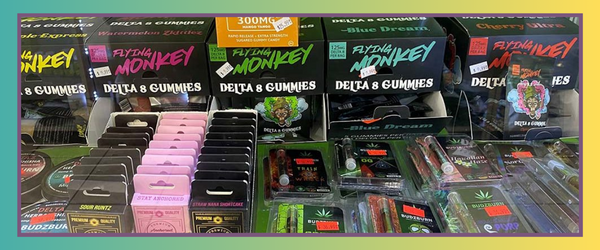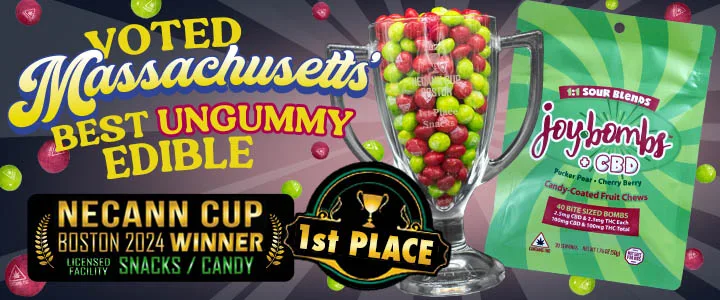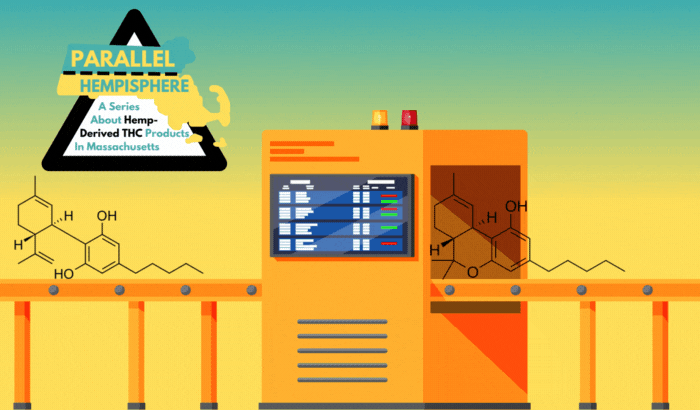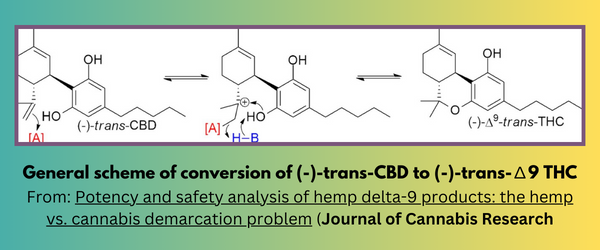10 details about synthetic delta-8 and delta-9 to help you navigate the parallel hempisphere in Massachusetts
By Dana Forsythe
with additional reporting and editing by Chris Faraone
Of the issues that are sure to summon debate throughout 2024, hemp-derived synthetic cannabinoids—and untold intersecting science, commerce, health, and legal hot potatoes—may prompt the most clamor. Our team at Talking Joints Memo enlisted ace culture reporter Dana Forsythe to help us survey the landscape and speak with stakeholders and experts to produce a series that untangles the topic. This second of five installments breaks down some of the tedious basics that are important to grasp in order to see the bigger picture. -TJM Editors
←Click here to go back to Part 1
The issue of hemp-derived cannabinoids that get you stoned—and that are sold outside of the highly regulated Massachusetts weed-licensing apparatus—is quickly heating up. Before moving ahead with the rest of this series, here’s some information about THC synthetics that will come in handy for wrapping your head around a labyrinthine situation which has been emerging coast to coast for years, and which recently arrived in force on shelves across the Bay State …
- The primary psychotropic ingredient in cannabis as people have historically encountered it is delta-9 tetrahydrocannabinol (THC), the most potent and well-known cannabinoid naturally occurring in high concentrations in cannabis plants, namely the flower buds. delta-9 THC tiggers a high by bonding with and overwhelming the body’s endocannabinoid receptors.
- While hemp’s primary property, CBD, won’t get you stoned on its own, it can be converted into synthetic versions of other cannabinoids, including delta-9 THC, that do get you stoned. One conversion process involves the introduction of a solvent, such as toluene or heptane, and a strong acid. The resulting THC is (hopefully) then purified, cleansed of unwanted byproducts, and tested by a lab.
- The 2018 US Agriculture Improvement Act (aka the Farm Bill) legalized hemp and hemp-derived products and extracts, specifically those with a total tetrahydrocannabinol (THC) level of 0.3% or less on a dry-weight basis, by removing hemp from the list of prohibited controlled substances. Since then, synthetic THC-infused beverages and edibles have surfaced across the country, mostly in liquor and convenience stores. A lot of companies will even ship to you.
- In states like Texas that haven’t legalized cannabis or have strict prohibitions against natural THC, products containing the synthetic delta-8 THC are legal and sold openly, sometimes with minimal restrictions or oversight, in major liquor and retail stores. delta-8 is known to lack the same desired effects of traditional THC. It differs from delta-9 THC in molecular structure, and because of its lower binding affinity to the CB1 receptor, the result is typically lower psychotropic potency.
- Because delta-8 THC is less potent than delta-9, Christopher Hudalla of ProVerde Labs in Milford said he frequently sees much larger doses in any given product: “Producers understand that delta-8 THC is only 20-50% the intoxicating power as delta-9 THC. So in order to equalize this, we frequently see delta-8 THC products which are much higher so they can compete with Delta-9 products. A normal delta-9 THC dose is 5 to 10mg per unit. For delta-8 THC, it is not uncommon to see a dose that is 100, 400, or up to 800 mg of delta-8 THC. That would be equivalent to a 400mg dose of delta-9 THC, and I believe this is one of the reasons so many children end up in the ER.”
- In addition to dodging most oversight, delta-8 can be produced much cheaper than delta-9. With that relatively low entry cost—one person interviewed for this series said that garage hemp-conversion ops are the “new meth labs”—the former has fueled the rush on the widely maligned subcategory of “gas station gummies.” These products are especially attractive to people in prohibition states, and in an adult-use state like Mass, to minors who can’t shop at dispensaries and price-conscious consumers looking to save money.

- While synthetic sips have been all the rage across the Bible Belt and Midwest since before pandemic shutdowns, in some states with legal cannabis like Massachusetts, beverage distributors have only recently started stocking drinks made with hemp-derived delta-9 THC, selling them in places other than regulated dispensaries which sell similar drinks made from natural cannabis. They are also showing up in bars and restaurants.
- States with medical and adult-use marijuana programs like Mass require extensive costly lab testing for licensed brands that sell products on the regulated market, but companies that sell the hemp alternatives in question don’t have to follow those protocols (though many do adhere to agricultural and other requirements in their own states, and often include testing information on their products, in some cases QR codes that trace to specific batch numbers).
- Hudalla of ProVerde Labs explained that there is still critical research that needs to be done about many of the hemp-derived spinoff cannabinoids showing up in lab tests—from delta-11 THC, to THCP, which is advertised as having 30 times the strength of regular weed, to something called CBNO. Some synthetics, he said, contain up to 30 contaminants.
- This is only the beginning of a moving situation that’s unraveling around synthetic THC in the commonwealth. Chatter is begetting outrage, with CCC-licensed companies speaking out against what they see as questionable business practices, and hemp advocates defending themselves, from social media all the way to Beacon Hill.
With this handy background reference guide, hopefully you can more easily digest the delta drama as it continues to unfold.



























